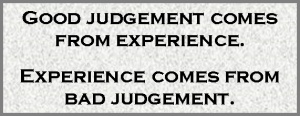 September 2017
September 2017
The Condo Act encourages directors to rely on the good judgement of others when making decisions on behalf of the condo corporation. Those who rely on this good judgement cannot be found in breach of their fiduciary duty.

One way to understand obligations of fiduciary duty is to consider how decisions are made. One matter important to most condo corporations more than ten years old is electricity submetering. This is a matter where fact, data and rumour come together.
Submetering is generally acknowledged as a more effective way of managing electricity use and costs than bulk metering – where the condo corporation pays for in-suite electricity use. By way of research a board would likely seek advice and information from multiple sources. They would find that submetering is recognized as an effective way to reduce overall electricity use and expenditures. Historical data on past conversions support this conclusion as do industry energy efficiency experts.
Opponents of electricity submetering are likely to include some board members and residents. Opposition tends to rely on anecdotal tales of residents in other buildings dissatisfied with submetering. Some may develop alternate financial analysis suggesting that submetering will not result in a financial saving. Some may be opposed for philosophical reasons. Yet others may simply prefer the status quo they understand to the uncertainly of change.
Section 37(3) of the Condo Act
A director shall not be found liable for a breach of a duty mentioned in subsection (1) if the breach arises as a result of the director’s relying in good faith upon,
(a) financial statements of the corporation that the auditor in a written report, an officer of the corporation or a manager under an agreement for the management of the property represents to the director as presenting fairly the financial position of the corporation in accordance with generally accepted accounting principles; or
(b) a report or opinion of a lawyer, public accountant, engineer, appraiser or other person whose profession lends credibility to the report or opinion.
Directors have an obligation to rely on the good judgement of experts, particularly when supported by data. Yet it can be difficult to support an issue when vocal opposition may exist, typically based on perceptions of personal gain, or it conflicts with current beliefs.
Directors choosing to ignore the good judgement of experts and without reasonable justification may be in conflict with the Condo Act. They risk being found in breach of their duty as a director and causing owners to pay more than is necessary for electricity.



